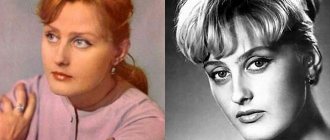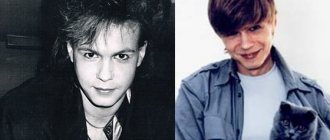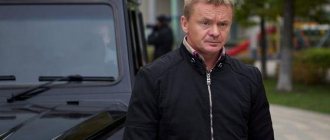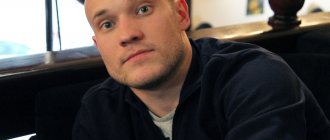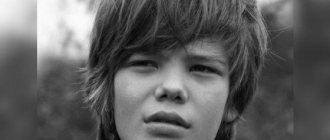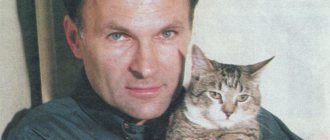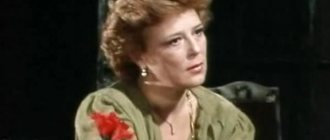Vladimir Zhirinovsky
Vladimir Zhirinovsky is one of the brightest representatives of the political elite. His bold statements and actions made Zhirinovsky the most prominent person in the State Duma. Vladimir Volfovich is the founder and chairman of the Liberal Democratic Party (LDPR), vice-speaker of the Russian State Duma of the fifth convocation.
Biography of Vladimir Zhirinovsky
Zhirinovsky Vladimir Volfovich was born on April 25, 1946 in Alma-Ata. His biological father, Wolf Isaakovich Eidelstein, was a lawyer and agronomist, who, according to recent press reports, worked as the head of the chemicals and fertilizers supply department in Tel Aviv. Mother Alexandra Petrovna Makarova, Russian by nationality, worked in the canteen of the local veterinary institute.
Vladimir Zhirinovsky in his childhood
Their family had many children. Vladimir Volfovich Zhirinovsky was the sixth child, raised by his stepfather, and has five maternal half-brothers and sisters. It is known that until 1964 the future politician bore the surname Eidelstein.
The future political figure of Russia studied at secondary school No. 25 named after. Dzerzhinsky in his native Almaty. After graduating from school, Vladimir Zhirinovsky decided to go to conquer Moscow and chose to enter the Institute of Oriental Languages at Moscow State University, where he entered the Faculty of History and Philology. At the same time, Vladimir Volfovich studied at the University of Marxism-Leninism at the Faculty of International Relations.
In 1988, Vladimir Zhirinovsky defended his doctoral dissertation on the topic “The Past, Present and Future of the Russian Nation.” He speaks four foreign languages, in particular English, French, German and Turkish.
How long has Vladimir Volfovich been in politics? Many voters often ask him a similar question. The political biography of Vladimir Volfovich began in his student years. Already in his youth, he actively began to take an interest in political processes.
Education
Vladimir passed the entrance exams and scored 18 points, which was not much. But Zhirinovsky was lucky - shortly before this, Khrushchev ordered the capital’s universities to introduce an unofficial quota for students from the provinces. So Vladimir became a student at the Institute of Oriental Languages at Moscow State University.
Vladimir Zhirinovsky in his youth
Until 1970, Vladimir studied Turkey and its languages at Moscow State University, while simultaneously studying at the University of Marxism-Leninism at the Faculty of International Relations. Zhirinovsky was an excellent student, activist and Komsomol leader of the course.
He was sent to Iran and Turkey for practice, but it did not last long - Vladimir was arrested and expelled from the country. Zhirinovsky himself said that he simply gave some Turk a badge on which Alexander Pushkin was depicted. Turkish police mistook him for Karl Marx, who was considered a propaganda figure at that time. Vladimir did not succeed in his career in international relations: after the deportation he became restricted from traveling abroad and, moreover, he really disliked the Turks.
Vladimir Zhirinovsky served in the army
In 1970, Zhirinovsky served in the army as a political commissar in an officer position at the headquarters of the Western Military District in Tbilisi and worked in the Soviet Peace Committee, dealing with problems in Western Europe. After service, Vladimir continued his studies and until 1977 he studied at the evening department of the Law Faculty of Moscow State University, graduating with honors.
Vladimir Zhirinovsky in politics
Vladimir Zhirinovsky's first job was the Soviet Peace Committee; in 1983, he headed the legal department of the Mir publishing house. It was there that Vladimir Volfovich began to show himself as a political figure, speaking at open party meetings with statements about the need to abolish the principles of nationality and party affiliation when appointing responsible positions in government structures.
Vladimir Zhirinovsky
The political activity of Vladimir Zhirinovsky started in the last years of the Perestroika era, during which he actively showed himself at rallies and participated in the work of some political organizations. In 1989, Zhirinovsky became one of the founders of the Liberal Democratic Party, and in March 1990 he headed it. A year later, Vladimir Volfovich ran for the post of President of Russia for the first time, then, according to the voting results, Zhirinovsky took third place after Boris Yeltsin and Nikolai Ryzhkov, gaining 6.2 million votes.
In 1993, Vladimir Volfovich became a deputy of the State Duma, where he was unanimously elected leader of the LDPR faction. In 1999, Vladimir Zhirinovsky took part in the gubernatorial elections of the Belgorod region, but lost them to the current governor Evgeny Savchenko. Without retreating one step from his goal - to occupy the chair of the President of the Russian Federation - in 2000, Vladimir Volfovich participated in the elections for the main position in the country for the third time, but he did not have enough two million votes to win.
In 2007, based on the results of the vote, the politician re-entered the State Duma and became one of the nine deputies of Chairman Boris Gryzlov. In the same year, Zhirinovsky once again applied to participate in the presidential elections, in which he received 9.37% of the votes.
Vladimir Zhirinovsky
In 2011, Vladimir Volfovich again headed the LDPR party. During the same period, he decided to fight for the presidency for the fifth time under the slogan “Zhirinovsky, or it will be worse,” but was defeated again, taking only fourth place after Vladimir Putin, Gennady Zyuganov and Mikhail Prokhorov.
Throughout his political activity, Vladimir Volfovich Zhirinovsky gained fame as the most eccentric politician, known for obscene insults against key European figures, calls for military action and scandalous brawls with his opponents in the State Duma.
His political “trick” was many unusual bills, in which he proposed to stop funding foreign states, introduce criminal prosecution for deceitful politicians, and lift the moratorium on the death penalty.
Personal life
The personal life of Vladimir Zhirinovsky is not as scandalous as his political career. In 1971, he married his childhood friend Galina Lebedeva, whom he met at a student camp. Zhirinovsky's wife is a virologist by profession and has a PhD in biological sciences.
For three years, the young people simply talked: everyday problems got in the way, both wanted to succeed in the profession and successfully graduate from college. In his free time from studying, Vladimir worked as a translator and went on business trips abroad.
Already in those years, the young man managed to impress his future mother-in-law: the guy periodically picked Galina up from home in a black Volga, which was assigned to employees serving foreigners.
The tall (height 182 cm) and courteous admirer of her daughter seemed to the woman a reliable candidate for the “position” of her son-in-law. In addition, by the time of the wedding, Zhirinovsky had managed to earn the down payment for a cooperative apartment.
RARE WEDDING PHOTOS OF SOVIET AND RUSSIAN STARS Actors, singers, politicians in elegant suits and white dresses….
Published by Tatyana Vasilievna Zaitseva Saturday, April 11, 2020
Vladimir Zhirinovsky and his wife Galina Lebedeva
In 1978, the Zhirinovsky couple divorced, but in 1985 the family was reunited. In 1993, on the eve of the celebration of their silver wedding, the couple legalized their relationship according to Orthodox rites and got married in church.
Zhirinovsky's son Igor Lebedev was born in 1972. He has a legal education and followed in his father's footsteps in a political career. Igor worked as an adviser to the minister in the Ministry of Labor and Social Development of the Russian Federation, and in 2000 he replaced his father as leader of the LDPR faction in the State Duma.
In 1998, twins Sergei and Alexander were born into the Lebedev family, due to which Zhirinovsky overnight became a grandfather twice over. Later, the grandchildren of Vladimir Volfovich entered the boarding school at Moscow State University.
According to media reports, the man has Spanish citizenship, but the politician himself does not comment on these rumors.
Published by Ali Magomedov Friday, January 17, 2020
Vladimir Zhirinovsky and his son Oleg Eidelshtein
The leader of the LDPR also has an illegitimate daughter, Anastasia Petrova, born in 1983. For many years, the woman worked in a responsible job and suffered serious health problems. Zhirinovsky spoke about this in an interview with Komsomolskaya Pravda in 2020.
In addition, at the age of 70, Vladimir Volfovich officially introduced his illegitimate son Oleg Eidelstein, who was born in 1986. His mother was Zhanna Gazdarova. An affair began between a politician and a girl in Cuba during a business trip. The boy was raised by his grandmother in the village of Chikola, North Ossetia. Later he graduated from Moscow State University and became a businessman.
In 2020, Zhirinovsky’s fortune was estimated at 5.3 million rubles. With such income, the LDPR member took 3rd place in the top 10 wealthiest faction leaders. Gennady Zyuganov (Communist Party of the Russian Federation) was in 1st place, Vladimir Vasiliev (United Russia) was in second place.
At the same time, there is information that the politician lives in a house worth $5 million. The mansion is located in the west of the capital, in an elite cottage village on Nezhinskaya Street.
Vladimir Zhirinovsky - scandals
The first scandal with Vladimir Zhirinovsky occurred in 1995, when the politician poured orange juice on opposition leader Boris Nemtsov live on the One on One program.
Vladimir Zhirinovsky on a LDPR propaganda poster
In the same year, he also showed himself among his colleagues in the State Duma by starting a fight with deputy Evgenia Tishkovskaya at a plenary session, seriously pulling her hair. In the future, fights will become the “calling card” of the activities of the Russian parliamentarian.
Zhirinovsky’s next “victim” was deputy Boris Nadezhdin, at whom the vice speaker threw a glass of water because of a dispute regarding a bill providing for Russian citizenship only to Russians. Then Nadezhdin had the imprudence to sarcastically address Zhirinovsky that, according to such a law, Vladimir Volfovich would never become a citizen of the Russian Federation.
In 2003, Vladimir Zhirinovsky again distinguished himself by recording an address to US President George W. Bush, in which he sharply accused many American officials of the war in Iraq, using profanity.
In 2012, Vladimir Zhirinovsky, who was a candidate for the presidency of Russia from the LDPR, caused a scandal on the set of the “Duel” program, where his opponent in the debate was the famous Russian singer Alla Pugacheva (a confidant of candidate Mikhail Prokhorov).
In 2014, Vladimir Volfovich severely insulted pregnant journalist Stella Dubovitskaya, who, after his statements addressed to her, ended up in the hospital. Then the controversial politician apologized to the girl, citing the fact that he did not know about her pregnancy.
The eccentric deputy has repeatedly become involved in legal scandals. Zhirinovsky's legal cases mainly consist of publicly unacceptable behavior, accusations and statements made by the politician.
Many Russians remember Vladimir Zhirinovsky for his participation in various television shows. In particular, discussions about US actions in different countries of the world have become popular on TV. At one of the TV shows on the Rossiya 1 TV channel, American journalist Michael Bohm tried to explain to those present about UN initiatives that have not been implemented by some states lately. According to the American, the principle “The responsibility to protect” is fundamental in the activities of the largest organization in the world. In response, the Russian politician accused the United States of illegal actions in Iraq and Syria.
In 2020, fans were surprised by the famous politician’s attitude towards the “feast” that was organized by Russian national team players Alexander Kokorin and Pavel Mamaev in one of the nightclubs in Monte Carlo. Zhirinovsky commented on the information about the behavior of Kokorin and Mamaev, calling such actions of athletes “the breadth of the Russian soul.”
Zhirinovsky: children and grandchildren
In his marriage to Galina, the politician had one son, Igor Lebedev. Zhirinovsky and his wife at one time gave the boy his mother’s surname specifically so that his father’s shadow would not interfere with his life. Today Vladimir Volfovich is proud of his son, because, having become an adult, he fully supported the ideas of his father and continued his work.
Just like his father, Igor was attracted to law. In 1996, he quite successfully graduated from the Law Academy in Moscow. Lebedev has long been a member of the LDPR party and over several years he has made a good political career:
- was an assistant to a State Duma deputy;
- held the position of expert specialist in the apparatus of the LDPR faction;
- appointed advisor to the Minister of Labor of the Russian Federation;
- was elected to the State Duma in 1999, 2003, 2007, 2001.
Based on this track record, we can conclude that Igor Vladimirovich’s political career was quite successful, however, just like his personal life.
Lebedev’s wife’s name is Lyudmila, and not too much information is known about her. In his interviews, Igor does not like to answer questions about his wife, in all likelihood, protecting her from the annoying attention of the press. It is only known that the young people have known each other almost since childhood. In 1998, their twin sons were born: Alexander and Sergei. Igor says that he really wanted to name one of them in honor of his father - Vladimir, but Zhirinovsky dissuaded him from this idea. Today, both brothers are students at a prestigious boarding house at Moscow State University.
Their grandfather admits that, unfortunately, he communicates with his grandchildren very rarely, at best, once a month, since he sorely lacks time for everything.
Igor Lebedev confirmed in one of his interviews that the grandfather meets with his grandchildren extremely rarely; at best, he congratulates them on their birthday over the phone. Basically, attention is paid to Alexander and Sergei by grandmothers, who have much more free time than Vladimir Volfovich. But there are other children of Zhirinovsky that are worth talking about.
Vladimir Zhirinovsky about Ukraine
Vladimir Zhirinovsky speaks about Ukraine in his traditional manner and style. He does not consider Ukrainians a “brotherly people” and confidently states that the situation in Ukraine could provoke the Third World War, and through the fault of the Ukrainian government. The Russian deputy believes that in February 2014 a coup d’etat took place in Ukraine, and the leading world powers, which were interested in this state of affairs, actively supported Euromaidan activists.
Vladimir Zhirinovsky
According to Vladimir Zhirinovsky, in 2020 there will be a complete collapse of Ukraine, from which “only a few regions with a population of about 15 million people will remain, and the remaining territories will be “plundered” by neighboring states.” At the same time, the “monster of Russian politics” believes that only Russian President Vladimir Putin can decide the fate of Ukrainian statehood, declaring that a decision on this issue has allegedly already been made.
Vladimir Zhirinovsky declares that the war in Ukraine is nothing more than “genocide of the Russian people” living on the territory of the Ukrainian state. He believes that the blame for this lies with Ukrainian President Petro Poroshenko and former Prime Minister Arseniy Yatsenyuk. As a sign of support for the DPR and LPR militias, in 2014 Zhirinovsky sent them his personal Tiger SUV.
Policy
According to Zhirinovsky himself, his political career was predetermined in his early youth. Having received a legal position at the Mir publishing house, he often has to give speeches to the public.
Vladimir Zhirinovsky
Feeling great inner strength in himself, in 1990 Vladimir Zhirinovsky created the Liberal Democratic Party (LDPR), which is still inseparable from his personal biography.
A year later, the politician is running for the post of President of Russia, taking 3rd place on the list. From that time on, he became the sole leader of his party, and in 2000 he decided to participate in the election race again. Zhirinovsky successfully wins the sympathy of his voters and to win the 2000 elections, he only needs 2 million votes.
Vladimir Volfovich also took part in the elections of 2007 and 2011, but he has not yet succeeded in taking the post of head of state.
For his unusual political biography, Zhirinovsky became famous as one of the most scandalous and eccentric characters not only in Russian politics, but throughout the continent.
He is the author of many bills. His electorate knows full well that he advocates the toughest measures against corrupt officials, as well as lifting the moratorium on the death penalty.
An interesting feature of Zhirinovsky’s biography is the fact that many of his political predictions (regarding Middle Eastern problems, relations with the West, etc.) are fulfilled with amazing accuracy.
Vladimir Zhirinovsky about Kazakhstan
In February 2014, a Russian politician called for depriving the Central Asian states of their independence. Zhirinovsky, speaking at a rally in Moscow, proposed creating a Central Asian federal district, and its composition would include Kazakhstan, Turkmenistan, Uzbekistan, Kyrgyzstan and Tajikistan.
In his opinion, the cities in Kazakhstan were built by Russian colonists, and the titular nation does not have broad rights, since millions of citizens of the country have Russian roots. Similar thoughts of Vladimir Zhirinovsky are recorded in a video entitled “About Nazarbayev, where are you and where am I,” which became popular on the YouTube video hosting site.
In Kazakhstan, parliamentarians immediately called on law enforcement agencies, as well as the leadership of the Ministry of Foreign Affairs, to issue a resolution banning Zhirinovsky from entering the territory of the state. The deputies in the corresponding request indicated that “Mr. Zhirinovsky goes beyond all limits, making such offensive statements publicly, encroaching on the sovereignty and independence of Kazakhstan.”
A similar entry ban has already been considered before. In 2005, the Kazakh authorities opposed Zhirinovsky’s visit to the country. The latest statements from the disgraced Russian politician about the vague future of the republic were clearly not to the liking of representatives of the top leadership of the state.
Scandalous statements
Vladimir Zhirinovsky speaks about Ukraine in his traditional manner and style. He does not consider Ukrainians a fraternal people and confidently declares that the situation in this country could provoke the Third World War, and through the fault of its government.
In February 2014, a Russian politician called for depriving the Central Asian states of their independence. Zhirinovsky, speaking at a rally in Moscow, proposed creating a Central Asian federal district, and its composition would include Kazakhstan, Turkmenistan, Uzbekistan, Kyrgyzstan and Tajikistan.
In his opinion, the cities in Kazakhstan were built by Russian colonists, and the titular nation does not have broad rights, since millions of citizens of the country have Russian roots. Similar thoughts of the politician are recorded in a video entitled “About Nazarbayev: where are you, and where am I,” which became popular on the YouTube video hosting site.
View this post on Instagram
A post shared by Vladimir Zhirinovsky (@zhirinovskiy) on May 7, 2018 at 12:31pm PDT
Vladimir Zhirinovsky and Dmitry Medvedev
In Kazakhstan, parliamentarians immediately called on law enforcement agencies, as well as the leadership of the Ministry of Foreign Affairs, to issue a resolution banning Zhirinovsky from entering the territory of the state.
A similar entry ban has already been considered before. In 2005, the authorities of the Republic of Kazakhstan opposed Zhirinovsky’s visit to the country. The latest statements from the disgraced Russian politician about the vague future of the republic were clearly not to the liking of representatives of the top leadership of the state.
In October 2013, speaking in the “Duel” program on the Rossiya-1 TV channel, the leader of the LDPR proposed surrounding the North Caucasus with barbed wire and “expelling the Chechens, Dagestanis and Ossetians from Central Russia.”
The reaction followed immediately - Zhirinovsky was condemned not only by representatives of the communities, but also by the head of the Chechen Republic Ramzan Kadyrov, who urgently demanded that the people's representative be removed from the State Duma.
View this post on Instagram
A post shared by Sosnovskoye MO LDPR (@ivy_ldpr) on Apr 25, 2020 at 12:02am PDT
Politician Vladimir Zhirinovsky
In January 2012, the Komsomolskaya Pravda newspaper posted on its website a fragment of Zhirinovsky’s interview with the Top Secret channel. In it, the leader of the LDPR stated that the inability of Mikhail Gorbachev and Boris Yeltsin to effectively govern the largest state on the planet is explained by their origin. In particular, according to the deputy, in the Urals “the population is generally stupid.”
In 2020, at Vladimir Solovyov’s debates preceding the presidential elections, Zhirinovsky, without mincing words, addressed Ksenia Sobchak. The politician managed to bring his colleague to tears. The TV presenter left the studio.
Nevertheless, there are people around the man for whom he felt sincere sympathy. It is known that Vladimir Volfovich was closely acquainted with Mikhail Krug. During trips to Tver, he visits the monument to the singer.
In the year of celebrating Zhirinovsky’s 70th anniversary, the hero of the day was invited to appear on the TV show “Evening Urgant”, and a year later he visited Boris Korchevnikov’s studio on the program “The Fate of a Man”.
Vladimir Zhirinovsky about the inhabitants of the Urals
In January 2012, the Komsomolskaya Pravda newspaper posted on its website a fragment of Zhirinovsky’s interview with the Top Secret channel. In it, the leader of the LDPR stated that the inability of Mikhail Gorbachev and Boris Yeltsin to effectively govern the largest state on the planet is explained by their origin. In particular, according to the deputy, in the Urals “the population is generally stupid.”
“The morons live there. From Perm to Yekaterinburg it’s terrible. This population is moronic. It may be healthy, but if you take him by intelligence, then he is stupid to the extreme,” said Vladimir Zhirinovsky, pointing out that many years of experience traveling around Russia allows him to draw such conclusions.
Political Views
Vladimir Zhirinovsky became famous for his extraordinary ideas. For example, he proposed fully funding foreign states, lifting the moratorium on the death penalty, and prosecuting those politicians who could not or did not want to fulfill their election promises.
Vladimir Zhirinovsky also became famous for his harsh and defiant statements. The celebrity’s biography in 1995 was “decorated” by a scandalous incident - on the live broadcast of the “One on One” program, the politician doused his opponent (Boris Nemtsov) with juice. In 2003, Vladimir Volfovich recorded a bold appeal to the President of the United States, George W. Bush. In it, the politician, without holding back in his expressions, condemned the war in Iraq.
Personal life of Vladimir Zhirinovsky
The personal life of Vladimir Zhirinovsky is not as scandalous as his political career. In 1971, he married his childhood friend Galina Lebedeva, whom he met at a summer camp. Zhirinovsky's wife is a virologist by profession and has a PhD in biological sciences. In 1978, the Zhirinovsky couple divorced, but in 1985 their family was reunited.
In 1993, the Zhirinovsky couple, on the eve of celebrating the date of their silver wedding, legalized their relationship according to Orthodox rites and got married in church.
Zhirinovsky's son, Igor Lebedev, was born in 1972. He has a legal education and followed in his father's footsteps in his political career. He worked as an adviser to the minister in the Ministry of Labor and Social Development of the Russian Federation, and in 2000 he replaced his father as leader of the LDPR faction in the State Duma.
Igor Lebedev and Vladimir Zhirinovsky
In 1998, twins Sergei and Alexander were born into the Lebedev family, due to which Vladimir Zhirinovsky overnight became a grandfather twice over. Currently, Zhirinovsky’s grandchildren are studying at a boarding school at Moscow State University.
Childhood and youth
Zhirinovsky Vladimir Volfovich was born on April 25, 1946 in Alma-Ata. His zodiac sign is Taurus. Biological father Wolf Isaakovich Eidelstein was a lawyer and agronomist, after leaving the USSR he worked as the head of the department for the supply of chemicals and fertilizers in Tel Aviv.
Mother Alexandra Petrovna Makarova, Russian by nationality, worked in the canteen of the local veterinary institute. The parents did not live together for even a year. My father was forced to emigrate for political reasons.
There were many children in the family. Vladimir Volfovich became the sixth child. He has five half-siblings from his mother's first marriage. Their father Andrei Vasilyevich Zhirinovsky died in 1944. The future politician also did not know his own father. According to one information, until 1964 he bore his real surname Eidelstein, according to another, already in childhood he was known as Zhirinovsky.
View this post on Instagram
A post shared by Vladimir Zhirinovsky (@zhirinovskiy) on Sep 18, 2020 at 8:04am PDT
Vladimir Zhirinovsky in his youth
Later, Vladimir’s mother remarried. The two eldest sons were sent to the Suvorov School, and the two eldest daughters were taken by their father’s sister. Only Volodya and his half-sister remained with their mother and stepfather. This family union also did not last long.
The future Russian politician studied at school No. 25 named after. F. E. Dzerzhinsky in his native Alma-Ata. The young man decided to receive higher education in Moscow. Vladimir chose to enter the Faculty of History and Philology of the Institute of Oriental Languages at Moscow State University.
The applicant was lucky: he was among the students from poor families who, according to the regulations, had to be admitted to the university. At the same time, Zhirinovsky studied at the University of Marxism-Leninism at the Faculty of International Relations.
In 1988, the man defended his doctoral dissertation on the topic “The Past, Present and Future of the Russian Nation.” Even in his youth, he mastered four foreign languages, in particular English, French, German and Turkish.
In the army, Vladimir served as a political management officer. Now he has been awarded the military rank of reserve colonel.
Zhirinovsky today
Today, Vladimir Zhirinovsky is trying to maintain his position in the “political field.” In January 2020, Zhirinovsky proposed changing the text of the anthem of the Russian Federation. In his opinion, it is necessary to “leave three verses and a fourth chorus,” since six verses of a modern anthem are “very long.” In addition, the leader of the LDPR said that the text of the anthem should “inspire” the citizens of the country.
“The anthem should inspire and show what kind of country it is. There’s not a word said about the country at all,” said Vladimir Zhirinovsky.
The deputy also believes that Russians are obliged to pay more attention to their health by following certain diets. According to the controversial politician, in 2013 he switched to a vegetarian diet, completely abandoning meat products. According to Vladimir Volfovich, meat is an extremely harmful product, and in the near future all members of the LDPR party will follow his example and become vegetarians.
Leonid Slutsky and Vladimir Zhirinovsky
At the pre-election debates on the Rossiya-1 TV channel on February 28, 2018, in response to what Ksenia Sobchak said, “Vladimir Volfovich, at your age you shouldn’t worry,” he insulted her. She doused him with water from a glass for this, for which the leader of the LDPR cursed Ksenia Sobchak obscenely.
On March 22, 2020, Renat Davletgildeev, a journalist for the Current Time TV channel, published a post on Facebook about the harassment he experienced from Vladimir Zhirinovsky, thereby subjecting Zhirinovsky to outing. In response, Zhirinovsky’s son, State Duma Deputy Speaker Igor Lebedev, called Davletgildeev’s words “slander,” which he regards “as an insult to the entire faction.”
On September 28, State Duma deputy Alexander Khinshtein filed a complaint against the actions of LDPR leader Vladimir Zhirinovsky to the Duma commission for monitoring the income of deputies and parliamentary ethics. On September 12, parliamentarians Zhirinovsky and Khinshtein had a skirmish during the recording of the “Evening with Vladimir Solovyov” program. The deputy claims in his letter that he “was subjected to insults from the State Duma deputy, the leader of the LDPR faction Zhirinovsky.” Khinshtein also notes in the letter that the leader of the LDPR “allowed himself a number of anti-Semitic statements”
[edit] Career
In 1970-1972 he served in the political department of the headquarters of the Transcaucasian Military District in Tbilisi. According to Zhirinovsky, during his two years of service he never mastered the Georgian language, but he studied political work, special propaganda and the national question well.
In January 1971, Zhirinovsky married Galina Aleksandrovna Lebedeva (whom he met in 1967, at a student camp[19]), a worker at the Research Institute of Virology.
In 1972-1975 he worked in the Western Europe sector of the International Department of the Soviet Peace Committee (SKPM). From January 1975 to May 1977 - at the Faculty of Economics of the Higher School of Trade Union Movement (in the dean's office for work with foreign students).
At the same time, he studied at the evening department of the Faculty of Law of Moscow State University (graduated in 1977).
In 1977, Zhirinovsky became an employee of the Inurkollegium of the USSR Ministry of Justice, dealing, among other things, with issues of receiving inheritance by USSR citizens from citizens of other states.
Zhirinovsky in his youth with a beard
In 1983, Zhirinovsky moved from Inyurkollegia to work in the legal department of the Mir publishing house.
On February 28, 1985, Zhirinovsky spoke for the first time at an open party meeting at the publishing house, which at that time was dedicated to the Central Committee resolution on personnel policy. He declared the need to abolish the principles of party affiliation and nationality, which usually guided the appointment to responsible positions; party bosses ignored his speech. Also in 1985, Zhirinovsky’s mother, Alexandra Pavlovna, died.
Two years later, Zhirinovsky decided to run for deputy of the Dzerzhinsky district council, for this he achieved the postponement of the general meeting of the labor collective of the Mir publishing house to the end of May in order to gain the support of the publishing house workers and management during this time. As a result, he gained the required majority in an open vote of the publishing house employees. There were almost no alternative elections to the councils at that time, so Zhirinovsky’s victory in the publishing house theoretically meant that he became the only candidate in the district and a deputy, but the election commission of the publishing house refused to register him, since he allegedly resigned from the Inyurkollegiya under the threat of legal action against him criminal case for bribery. Zhirinovsky denied the accusations and declared his innocence, and the publishing house employees were going to write a collective letter in support of him addressed to the first secretary of the Moscow City Committee of the CPSU, Boris Yeltsin, but were unable to “reach out” directly to Yeltsin. They never managed to get a new vote.
Since 1988, Zhirinovsky actively participated in meetings of various new public organizations and groups. In particular, he was one of those present at the “Society of Jewish Culture” at the Sholom Theater, and participated in societies with moderate pro-Jewish views. Also at the same time, he wrote a small program for his planned “Social Democratic Party of Russia”.
He took part in the election of director of the Mir publishing house, but was defeated. His candidacy for people's deputies of the RSFSR was also unsuccessful.
On December 13, 1989, together with Vladimir Bogachev, Lev Ubozhko and Akhmet Khalitov, he created the LDPSS party (Liberal Democratic Party of the Soviet Union). In the Palace of Culture named after. Rusakov in 1990, the first congress of the LDPR took place. Later expelled from the party by Bogachev due to Zhirinovsky’s “pro-Soviet” views. Zhirinovsky himself did not recognize the exception and on October 20, 1990, he held a conference of the Liberal Democratic Party of the Soviet Union, at which he expelled from the party the instigators of the rebellion in the party.
Zhirinovsky today
Since 2012, Vladimir Volfovich has been a member of the State Council of the Russian Federation. And at the end of 2011, Zhirinovsky became a candidate for President of the Russian Federation in the 2012 elections. Preliminary polls showed that 7-9 percent of voters were ready to vote for the politician. Thus, his candidacy was in second place. Only Vladimir Vladimirovich Putin received more votes. However, in the elections themselves, 6.22 percent of voters voted for Zhirinovsky. Vladimir Volfovich was beaten by three candidates - Mikhail Prokhorov, Gennady Zyuganov and Vladimir Putin. These are the achievements that decorate Zhirinovsky’s biography. The politician’s personal life is much less eventful. It is known that in 2013 the politician became a vegetarian. Now he is a devotee of a healthy lifestyle. According to Vladimir Volfovich, soon all members of the LDPR party will gradually become vegetarians.
Now you know about the life and career of one of the most famous people in the country - Vladimir Volfovich Zhirinovsky.
Zhirinovsky Vladimir Volfovich
Deputy of the State Duma of the VII convocation. Chairman of the Liberal Democratic Party of Russia. Member of the State Council. Six-time candidate for president of the Russian Federation. Honored Lawyer of the Russian Federation. Doctor of philosophical science. Academician of the Russian Academy of Social Sciences. Author of a number of books on political topics.
Vladimir Zhirinovsky was born on April 25, 1946 in Alma-Ata, Republic of Kazakhstan. The boy remembers his father only from the words of his mother. After the birth of his son, Wolf Isaakovich was deported to Poland, then moved to Israel, and later died under the wheels of a bus. In 1964, the young man graduated from high school in his hometown and entered the Institute of Oriental Languages at the Mikhail Lomonosov Moscow State University, majoring in Turkish Language and Literature, where he also studied at the military department. In 1969, he completed a year-long internship in the Turkish city of Iskenderun. At the same time, he graduated from the Faculty of International Relations of the University of Marxism-Leninism.
From 1970, for two years, Zhirinovsky served as an officer in the political department of the headquarters of the Transcaucasian Military District in the city of Tbilisi. He retired to the reserve with the rank of senior lieutenant. Then, until 1975, he worked in the Western Europe sector of the international department of the Soviet Peace Committee. For the next two years, he worked in the dean’s office for work with foreign students at the Higher School of Trade Union Movement.
From 1977 to 1983, Vladimir Volfovich was an employee of the foreign legal board of the Ministry of Justice. During this period, he graduated from the evening department of the Faculty of Law of Moscow State University. Later, having defended his dissertation, he received the degree of Doctor of Philosophy. Knows four languages: English, French, German and Turkish. Before starting his political career, he was involved in trade union work and served as the head of the legal department at the Mir publishing house.
Zhirinovsky's political career began in 1988, when he began to actively participate in meetings of various public organizations and groups that emerged en masse in conditions of openness and political freedom. In the same year, he took part in the seminars “Peace and Human Rights”, which were held at the Soviet Peace Committee. It was then that Vladimir Volfovich attracted attention as a speaker.
After this, Zhirinovsky began to often appear at various political meetings of informal groups, where he discussed the idea of creating some kind of party. At the beginning of May 1988, he participated in the Founding Congress of the Democratic Union party, but refused to join this organization.
Soon the politician came up with the idea of creating the Social Democratic Party and wrote a draft party program. In the second half of 1988, Zhirinovsky participated in the creation of the legal Jewish national movement and spoke at the founding conference of the Soviet society of Jewish culture “Sholom”.
Soon Zhirinovsky was elected a member of the board of the Society along with the former first secretary of the Birobidzhan regional committee of the CPSU Lev Shapiro and Yuli Kosharovsky. Vladimir Volfovich, as a member of the board of the Society, supervised four sections: humanitarian and legal, philosophical and religious, historical and external economic relations.
In the spring of 1989, together with Vladimir Bogachev, who broke away from the Democratic Party of Lev Ubozhko, Zhirinovsky created an initiative group of the Liberal Democratic Party. The LDP program became a short draft program of the Social Democratic Party.
Since 1990, Vladimir Volfovich has been involved in party work. A year later, he registered the Liberal Democratic Party of the Soviet Union with the Ministry of Justice; with the collapse of the Union, the LDP changed its status to Russian and acquired the name LDPR. In the parliamentary elections that followed in December 1993, the LDPR was ahead of all other parties in terms of the number of votes received. In December 1995, Zhirinovsky was re-elected to the State Duma of Russia of the 2nd convocation on the LDPR list. Since then, the party has managed to maintain a presence in the Duma.
He entrusted the leadership of the LDPR faction in the State Duma of the 3rd and 4th convocations to his son Igor Lebedev, and he himself became Deputy Chairman of the State Duma. Since October 2005, he has been a member of the Council under the President of the Russian Federation for the implementation of priority national projects.
Dmitry Medvedev was elected President of Russia on March 2, 2008 in the all-Russian elections. The candidates for the post of President were: Dmitry Medvedev, nominated by the United Russia party; From the Communist Party of the Russian Federation - Gennady Zyuganov; From the LDPR - Vladimir Zhirinovsky; From the Democratic Party - Andrey Bogdanov. According to the Decree of the Central Election Commission of March 7, 2008, Dmitry Anatolyevich Medvedev was elected to the post of President of Russia, gaining 70.28% of voters. Vladimir Zhirinovsky came third with 9.37% of voters.
Zhirinovsky ran in Russian presidential elections six times, but was unsuccessful. He is known for proposing to lift the current moratorium on the death penalty, introduce criminal prosecution of politicians who did not fulfill election promises, and introduce Ukraine and Belarus into Russia as federal districts.
In the elections on September 18, 2020, Zhirinovsky was elected as a Deputy of the State Duma of the VII convocation as part of the federal list of candidates nominated by the political party “Liberal Democratic Party of Russia”. Leader of the LDPR faction.
LDPR leader Vladimir Zhirinovsky, at a meeting of the State Duma on June 19, 2020, left the plenary hall in protest because the majority of deputies rejected the bill on a simplified procedure for issuing Russian citizenship to Russian children. The draft law proposes to provide Russian citizenship in a simplified manner to citizens living abroad, one of whose parents is Russian.
On December 11, 2020, Vladimir Zhirinovsky met with Russian President Vladimir Putin. The conversation took place on the eve of the 30th anniversary of the LDPR. The head of state congratulated the party leader and all its members on their anniversary and noted their contribution to achieving common goals for the country. During the conversation, Zhirinovsky spoke in favor of reducing VAT, noting that sometimes tax reductions can have a positive effect. In addition, the LDPR leader suggested that the president shorten the New Year holidays and make December 31 a day off.
At the final plenary meeting of the State Duma of the Federal Assembly of the Russian Federation on December 18, 2019, Prime Minister Dmitry Medvedev awarded the deputies with government awards and certificates. For services in legislative activities aimed at solving strategic problems of the country's socio-economic development, Vladimir Volfovich Zhirinovsky was awarded the Stolypin medal, 1st degree.
Awards and Recognition of Vladimir Zhirinovsky
Russian awards:
Order of Merit for the Fatherland, II degree (April 18, 2016) - for great contribution to the development of Russian parliamentarism and active legislative activity Order of Merit for the Fatherland, III degree (May 8, 2011) - for merits in legislative activity and development Russian parliamentarism Order of Merit for the Fatherland, IV degree (April 20, 2006) - for active participation in legislative activities and many years of fruitful work Order of Alexander Nevsky (January 20, 2020) - for active legislative activities and many years of conscientious work Order of Honor (21 May 2008) - for merits in legislative activity, strengthening and development of Russian statehood Zhukov Medal Medal “In Commemoration of the 850th Anniversary of Moscow” Medal “In Commemoration of the 300th Anniversary of St. Petersburg” Medal “For Merit in Conducting the All-Russian Population Census” Stolypin Medal P. A. II degree (Government of the Russian Federation, May 4, 2012) - for merits in legislative activities aimed at solving strategic problems of the socio-economic development of the country Stolypin Medal P. A. I degree (Government of the Russian Federation, December 18, 2020 ) - for merits in legislative activities aimed at solving strategic problems of the country's socio-economic development
Foreign awards:
Order of Honor and Glory, II degree (Abkhazia, September 29, 2005) - for strengthening friendship between the peoples of Abkhazia and Russia Memorial sign “Samara Cross” (2013)
Awards of the constituent entities of Russia:
Order "For Merit" (Ingushetia, May 14, 2014) - for strengthening friendship between peoples Medal "For the Defense of the Republic of Crimea" (Republic of Crimea, June 2, 2020) - for significant personal contribution to the formation and development of the Republic of Crimea, and in connection Happy Russia Day
Departmental awards:
Medal “Participant of the military operation in Syria” (2016) Medal of Anatoly Koni (Ministry of Justice of Russia) Badge “Honorary Railway Worker” Honorary weapon - personalized dagger from the Ministry of Internal Affairs of the Russian Federation.
Awards of unrecognized states:
Order “For Personal Courage” (PMR, April 18, 2006) - for personal contribution to the development and strengthening of friendship and cooperation between the Russian Federation and the Pridnestrovian Moldavian Republic, active work in the field of protecting the rights and interests of compatriots and in connection with the 60th anniversary.
Ranks:
Doctor of Philosophy The honorary title “Honored Lawyer of the Russian Federation” (December 29, 2000) - for services in strengthening Russian statehood and active legislative activity, by Order of the Minister of Defense of the Russian Federation No. 107 of March 27, 1995, Vladimir Zhirinovsky was awarded the military rank of lieutenant colonel in reserve. Honorary Doctor of the Russian Academy of Advocacy Full member of the International Academy of Informatization Honorary Academician of the Academy of Natural Sciences Full member (academician) of the International Academy of Ecology and Natural Resources (MAEP) Full member (academician) of the Academy of Social Sciences Professor
The works of Vladimir Zhirinovsky
Filmography
1995 Tripping with Zhirinovsky (Dir. Paul Pawlikowski, Documentary, BBC) 1997 Ship of Doubles Captain Zharov 2000 33 square meters cameo 2001 Kiskin House cameo 2004 Parisian Love Bones Gumankova Character name not specified 2007 Reporters cameo 2008 Wick (They Came to You, No. 186) official Semyon Nikolaevich Ministry of Finance 2016 Zhirinovsky (Dir. Alexander Evsyukov, Documentary, VGTRK
Works in the theater
Moscow Theater "School of Modern Play":
“Overheard, Spied, Unrecorded” (improvisation performance); “Woe from Wit” (musical version of the classic comedy), role of Famusov; premiered on January 18, 2018.
Discography
1999 - The Real Colonel 2003 - Vladimir Zhirinovsky sings 2004 - Happy New Year! 2011 - For those in traffic jams
Songs by and about Zhirinovsky
Andrey Makarevich - “Congratulatory” “Parrot” - “Eh, Vladimir Volfovich” (1991) “Ex-Gas Sector” - “Hymn to Zhirinovsky” “Thieves” - “Letter to Zhirinovsky” (2006) Alexander Kharchikov - “Zhirik” Mr. Daduda - “A woman with a cart is easier for a mare” “Idol” (1993) Paddy Goes To Holyhead - “Shirinovski” - harsh criticism, accusations of Nazism and anti-Semitism, betrayal of her own father Manic Street Preachers - Archives of pain (1994) - Vladimir is mentioned Zhirinovsky, Yeltsin, Milosevic and many other well-known politicians “The same Kolya - Vladimir Volfovich” - a track from 2011, similar to the previous one, accusing Zhirinovsky of lying, anti-Semitism, etc. For the 20th anniversary of the LDPR, a disc was released with songs performed by and about Zhirinovsky. Vladimir Volfovich performed both famous hits and original songs. In 2003, together with the singer Oscar, he recorded the song “Let's Go for a Walk.” Zhirinovsky's address to the 43rd US President George W. Bush from Iraq in 2003 (according to Zhirinovsky himself) also became the subject of musical parodies. They took the most significant statements from the address and set them to music. It turned out that Zhirinovsky himself performed the song. He was a character in the humorous programs “Town”, “Dolls”, “Cartoon Personality”. Repeatedly performed at New Year's music programs.
On TV
In 1999, the TV-6 channel aired a program with the participation of Zhirinovsky, “This is Zhirinovsky.” In 2002, the Moscow M1 TV channel aired the talk program “University of Millions” with Zhirinovsky as the host. In 2006, he participated with rapper Seryoga in the show “Two Stars”, and also recorded songs with him.
Participation in video clips
2006 “Olya and AIDS” Seryoga and Vladimir Zhirinovsky
Books
Zhirinovsky V.V. The last throw to the South. - M., 1993 Zhirinovsky V.V. We need provinces of one Russian state. - M., 1995 Zhirinovsky V.V. The last blow to Russia. - M., 1995 Zhirinovsky V.V. LDPR: ideology and politics. - M., 1995 Zhirinovsky V.V., Vishnyakov V.G. Our goal is a united Russian state. - M., 1995. Zhirinovsky V.V. Spit on the West. - M., 1995 Zhirinovsky V.V. The last carriage to the North. - M., 1995 Zhirinovsky V.V. What should the Russian state be like? - M., 1995 Zhirinovsky V.V. With tanks and guns or without tanks and guns. - M., 1995 Zhirinovsky V.V. Ideological foundations of the Liberal Democratic Party of Russia. — 1995 Zhirinovsky V.V. LDPR and military policy of Russia. - M., 1995 Zhirinovsky V.V. LDPR and the national economy of Russia. — 1995 Zhirinovsky V.V. Political landscape of Russia. - M., 1995 Zhirinovsky V.V., Lisichkin V.A. Revival of Russian liberalism. - M., 1995 Zhirinovsky V.V. Economic thoughts of politics. - M., 1995 Zhirinovsky V.V. Let’s avenge Russia. - M., 1996 Zhirinovsky V.V. Political classics. Collection Op. in 10 volumes - M., 1996-1997. Zhirinovsky V.V. Russian question: solutions. - M., 1997 Zhirinovsky V.V. Ideology for Russia. - M., 1997 Zhirinovsky V.V. National Security Doctrine of the Russian Federation: Basic principles and implementation mechanism. - M., 1997. Zhirinovsky V.V. Social crisis in Russia: main problems, their causes and consequences. - M., 1997 Zhirinovsky V.V. Essays on geopolitics. - M., 1997 Zhirinovsky V.V. Pseudo-Christian religious organizations in Russia. - M., 1997 Zhirinovsky V.V. The Fiery God of the Hare Krishnas" - M.: Publication of the Liberal Democratic Party of Russia. - M., 1997 Zhirinovsky V.V. Past, present and future of the Russian nation: Russian question: social and philosophical analysis: dissertation in the form of a scientific report for the degree of Doctor of Philosophy: 22.00.01 / Moscow State University. M. V. Lomonosov. - M., 1998. - 72 p. Zhirinovsky V.V., Yurovsky V. The ABC of Sex. - M., 1998. Zhirinovsky V.V. Ivan, smell your soul!. - M., 2001 Zhirinovsky V.V. LDPR: 20 years of struggle. - M., 2009 Zhirinovsky V.V. Thoughts and aphorisms! - M., 2010 Zhirinovsky V.V. The main enemy of Russia is the official. - M., 2010 Zhirinovsky V.V. Freaks. - M. 2010 Zhirinovsky V.V. Russia - and for Russians too. - M., 2011 Zhirinovsky V.V., Vasetsky N.A. Sociology of world politics: Textbook for universities, 2012. Zhirinovsky V.V. Ethnogeopolitics: Textbook / Ed. N. A. Vasetsky. - M.: LDPR, 2012. Zhirinovsky V.V. Ethnogeopolitics: A textbook for students. universities — 2nd ed. - M.: LDPR, 2013. - 464 p. — 3000 copies. Zhirinovsky V.V. Almanac of the LDPR: History in dates and persons. - M.: Liberal Democratic Party of Russia, 2013. Zhirinovsky V.V., Vasetsky N.A. Sociology of world politics: Textbook. aid for students universities - M.: LDPR, 2013. - 432 p. — 3000 copies. Dobrenkov V.I., Zhirinovsky V.V., Vasetsky N.A. Sociology of world civilizations: A textbook for university students. - M.: Academic project, 2014. - 608 p. - (Gaudeamus).
Articles
Zhirinovsky V.V. Russian question: internal political aspects // Bulletin of Moscow State University. Series 18. Sociology and political science. - 1998. - No. 1. Zhirinovsky V.V. Russian question: foreign policy aspects // Bulletin of Moscow State University. Series 18. Sociology and political science. - 1998. - No. 2.
Family of Vladimir Zhirinovsky
Wife - Galina Aleksandrovna Lebedeva (marriage from 1971 to 1978), virologist, candidate of biological sciences.
The eldest son, Igor Vladimirovich Lebedev, was born in 1972. Has a legal education (Legal Academy). In January 2000, he was elected chairman of the LDPR faction in the State Duma of the third convocation. Elected in the State Duma on the federal list of the Zhirinovsky Bloc. Before being elected to the Duma, he worked in the Ministry of Labor and Social Development of the Russian Federation as an adviser to the minister (Sergei Kalashnikov, a former member of the LDPR faction in the State Duma of the 2nd convocation).
Twin grandchildren Alexander and Sergei (born 1998), study at a boarding school at Moscow State University. Grandson (born April 3, 2018).
Illegitimate son Oleg Vladimirovich Eidelshtein (Gazdarov) (born December 13, 1986; Moscow), from Zhanna Gazdarova.
Illegitimate daughter Anastasia Vladimirovna Petrova.
24.04.2020
